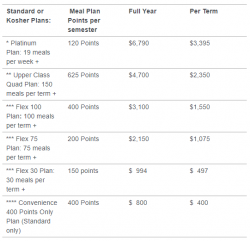On May 3, in the Barnard administration’s annual “tuition and fees” update email, COO Robert Goldberg and (soon-to-be-departing) Dean of the College Avis Hinkson informed students that there would be “several important changes” to Barnard’s meal plan. These changes, the email read, “resulted from discussions with students” and were purportedly intended to “address the issue of food insecurity.”
The email went on to describe these changes. First, rather than having a set amount of guest swipes, Barnard students will be able to swipe in guests up to the total number of swipes in their plans (which is how Columbia meal plans currently operate). Second, Barnard students will have 24-hour access to JJ’s place. And third, meal plan options will be “consolidated,” and students will be able to add points and swipes throughout the semester in small increments.
This initial message did not outline the actual, new consolidated meal plans or their costs. However, students were quick to find these new plans on Barnard’s tuition and fees page and point out issues these changes pose. Last year, Barnard offered about 15 different meal plans, including the Platinum Plan for first-years, Quad Upperclass Plan for upperclassmen living in the first-year dorms and Hewitt, and three “Basic” and “Convenience” plans for other upperclassmen and commuters. All of these plans, except for the Platinum and Quad Upperclass plans, cost under $1,000 per semester. (As of the writing of this post, all of these old plans are still visible on the Dining at Barnard website.)
The new options were more limited. Barnard students in the 2018-2019 year saw only five plans: Platinum, Upperclass Quad, Flex 100, Flex 75, and Convenience. Only the Convenience plan cost under $1,000 per semester, and this plan, according to language on the website, was only available to commuter students. Students living on campus would need to enroll in the Flex 75 plan (75 meals and 200 points per semester) at the minimum. This was a huge change for low-income students in particular, who often enroll in low meal plans in order to save money and cook for themselves. Students who were once able to get a convenience plan of only 300 points for $331/semester were now required to pay $1,075/semester. The new plans also required students to use more swipes, which is often less cost-effective than using points.
Once attention was called to these changes, the news spread like wildfire, primarily in Barnard Facebook groups:
Arianna Scotti, BC ’20, started a petition on Change.org yesterday in order to call wider attention to this issue. The petition calls for the administration to be held accountable for the effects its decisions will have on students. Demands include a points-only plan available to all students, multiple options with “better swipe-to-points ratios,” more options below $1,000/semester, and the ability for students to donate swipes as well as points. Students who have signed commit to “refuse to pay for or opt into a meal plan until Barnard offers cost-effective options that better address students’ needs.” In the short time that this petition has been live, it has already garnered over 600 signatures. Although some signers are parents and alumni, they most broadly are members of the student body: meaning that over 1/5th of Barnard students are in support.
In response to the concerns raised by this petition, as well as emails from concerned students and other members of the Barnard community, Vice President for Campus Services Gail Beltrone has sent two more emails to Barnard students about the meal plan options. The first email, sent at 9 pm this past Tuesday, “clarified” that all students, not only commuters, are able to choose the Convenience Plan (no swipes, 400 points), and that students will be able to donate swipes up to their full plan value. The Bursar website, Beltrone claimed, had not been fully updated. Barnard is thus meeting two of the demands of the petition.
In the second email, sent earlier this evening, Beltrone announced that Barnard would be introducing another less expensive meal plan option, called Flex 30: 30 meals swipes and 150 points per semester, at a cost of $497. As in previous administrative messages, Beltrone asserted that Barnard is “committed to ensuring that the plans meet students’ needs.” However, as the comments on the petition demonstrate, students are far from feeling their needs met.
- A selection of last year’s less expensive meal plan options
- All of next year’s meal plan options
As is clear from the screenshots above, even with the addition of the Flex 30 plan, students who could once choose between several options below $1,000/semester with varying points and swipes are now forced to pick from a much smaller selection and will face a cost increase regardless of which plan they choose.
“It seems that no one in the administration is interested in actually hearing and seeing student demands and complaints,” said Arianna Scotti, BC ’20, the petition’s creator. “I find it almost hysterical that they thought the solution to food insecurity on campus was charging more for a meal plan that doesn’t even give you two meals a day, it gives you one … Students who have trouble affording the cost of food should pay more for a meal plan that doesn’t even feed them all the time? … I find it hard to believe that came from talking with students.”
Scotti also pointed out that the administration has made no moves to address concerns about Hewitt’s cleanliness (it currently holds a B health rating) or lack of options for students with dietary restrictions. Prices are essentially being raised for an eatery in which mice, rats, and cockroaches have regularly been seen for several semesters.
“The changes that have been made have not been an adequate response that actually addresses the complaints and demands we have,” Scotti said. “[Barnard students’] health and well-being is at stake in the hands of people who have never eaten at Hewitt.”
Other students have echoed similar sentiments. “On top of the 4.5% tuition increase, it’s like insult to injury,” said Ellery Vaughan, BC ’19.
Scotti plans to continue campaigning for more administrative accountability and meal plans that better fit students’ needs; a key part of the petition urges administrators to actually regularly collect feedback from students, rather than obliquely referring to “conversations” with anonymous students in emails. Scotti suggested that other students who oppose the meal plans’ changes sign and share the petition, particularly with parents and alumni, and email VP Beltrone to express their concerns.
Read the Barnard administration’s official messages about these changes below:
- Excerpt from the tuition & fees email
- Clarification email
- Update email


 1 Comments
1 Comments




1 Comment
@Anonymous Good afternoon fellow academics, I would request that you take a look at my blog in which I deconstruct the myths about the Columbia Spectator at spectisrekt dot wordpress dot com